Related Research Articles
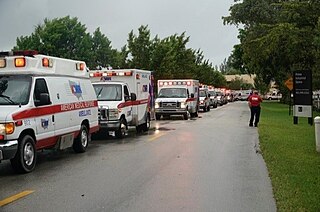
Emergency medical services (EMS), also known as ambulance services or paramedic services, are emergency services that provide urgent pre-hospital treatment and stabilisation for serious illness and injuries and transport to definitive care. They may also be known as a first aid squad, FAST squad, emergency squad, ambulance squad, ambulance corps, life squad or by other initialisms such as EMAS or EMARS.

Mahindra Satyam was an Indian information technology (IT) services company based in Hyderabad, India, offering software development, system maintenance, packaged software integration and engineering design services. Satyam Computer Services was listed on the Pink Sheets, the National Stock Exchange and Bombay Stock Exchange and provided services to a wide range of customers including 185 Fortune 500 companies.
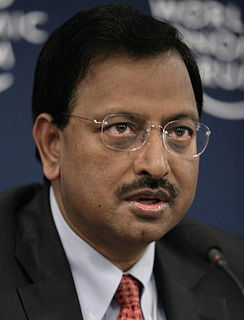
Byrraju Ramalinga Raju is an Indian businessman. He is the founder of Satyam Computer Services and served as its chairman and CEO from 1987 until 2009. Raju stepped down following his admission to embezzlement from the company to the tune of ₹7,136 crores, including ₹5040 crores of non-existent cash and bank balances. In 2015, he was convicted of corporate fraud, which led to the collapse of Satyam Computers.

A traditional birth attendant (TBA), also known as a traditional midwife, community midwife or lay midwife, is a pregnancy and childbirth care provider. Traditional birth attendants provide the majority of primary maternity care in many developing countries, and may function within specific communities in developed countries.
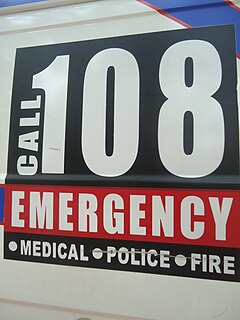
Dial-108, or one-zero-eight is a free telephone number for emergency services in India. It is currently operational in 18 states and two Union Territories. The 108 Emergency Response Service is a free emergency service providing integrated medical, police and fire emergency services. This system was introduced nationwide by former Union Health Minister, Dr. Anbumani Ramadoss. In Madhya Pradesh, the 108 GVK Ambulance facility was implemented in July 2009 by Honorable Chief Minister Shivraj Singh Chauhan. It was inaugurated by Health Minister Mr. Narottam Mishra. The service is a public-private partnership between state governments and private EMS providers. This 108 service was rolled out initially by Ramalinga Raju and his family on August 2005. It was initially a private funded initiative, but later signed MOUs with multiple state governments from August 2007. In 2007, Chief minister Narendra Modi launched these services in Gujarat on 29 August 2007. With the life-saving service becoming so popular in the rural parts of combined Andhra Pradesh, the (108) system was later introduced by the Central government of India in other parts of India. The system was originally designed by Satyam Infotech. As of November 2014, this service had handled over 540,000 emergency cases in India. On an iOS device, "Hey Siri, 108" command to Siri will place an emergency call.
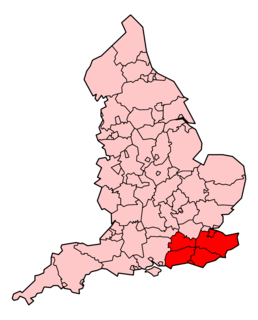
The South East Coast Ambulance Service NHS Foundation Trust (SECAmb) is the NHS ambulance services trust for south-eastern England, covering Kent, Surrey, West Sussex and East Sussex. It also covers a part of north-eastern Hampshire around Aldershot, Farnborough, Fleet and Yateley. The service was made an NHS foundation trust on 1 March 2011.
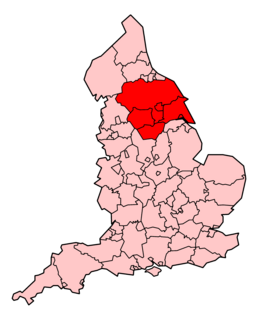
The Yorkshire Ambulance Service NHS Trust (YAS) is the NHS ambulance service covering most of Yorkshire in England. It is one of ten NHS Ambulance Trusts providing England with emergency medical services as part of the National Health Service it receives direct government funding for its role.

Emergency medical services in the United Kingdom provide emergency care to people with acute illness or injury and are predominantly provided free at the point of use by the four National Health Services (NHS) of England, Scotland, Wales, and Northern Ireland. Emergency care including ambulance and emergency department treatment is only free to UK residents and a charge may be made to those not entitled to free NHS care. The NHS commissions most emergency medical services through the 14 NHS organisations with ambulance responsibility across the UK.
Air ambulance services in the United Kingdom provide emergency medical functions, patient transport between specialist centres, or medical repatriation. Services are provided by a mixture of organisations, operating either helicopters or fixed-wing aircraft. All emergency air ambulance helicopters in England, Wales, and Northern Ireland are operated by charities, while Scotland has one charity service in addition to its two NHS-funded helicopters. Fixed-wing air ambulances, used for patient transport, may be government or privately operated.
Ram Mynampati is an Indian business executive. He was a board member of Satyam Computer Services until January 2009, when news of an accounting fraud at Satyam broke. He was briefly the interim CEO after the then-Chairman and CEO Ramalinga Raju admitted to the accounting fraud and stepped down. He was replaced by A. S. Murthy as the CEO on February 5, 2009.
Maytas was a group of companies founded by B. Ramalinga Raju. It included Maytas Properties and Maytas Infra Limited.
The Satyam Computer Services scandal was India's largest corporate fraud. The founder and directors of India-based outsourcing company Satyam Computer Services, falsified the accounts, inflated the share price, and stole large sums from the company. Much of this was invested in property. The swindle was discovered in late 2008 when the Hyderabad property market collapsed, leaving a trail back to Satyam. The scandal was brought to light in 2009 when chairman Byrraju Ramalinga Raju confessed that the company's accounts had been falsified.
Emergency medical services in Sri Lanka is being established using a public/private system aimed at the provision of emergency ambulance service, including emergency care and transportation to hospitals. The Pre-Hospital Care Committee is part of the Trauma Secretariat of the Sri Lanka Ministry of Healthcare and Nutrition and was established following the 2004 tsunami. The goal of the Pre-Hospital Care Sub-Committee is “During this generation and continuing for future generations, everyone in Sri Lanka will have access to trained pre-hospital medical personnel, ambulances are available to transport the sick and injured safely to hospitals, complications from harmful or inadequate pre-hospital care is eliminated so physician and nursing personnel at hospitals are delivered patients they are able to professionally treat and rehabilitate back to society as contributing citizens.” Pre-Hospital care is an essential, core component of trauma system.
T. R. Prasad is a bureaucrat from Andhra Pradesh, India, who worked as cabinet secretary and defence secretary in the national government.
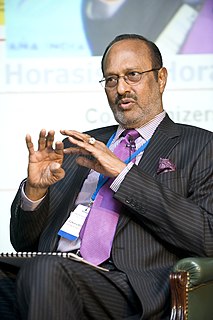
Gunapati Venkata Krishna Reddy is a philanthropist and entrepreneur. GVK Reddy is the founder and Chairman of GVK Group, a business conglomerate with a predominant focus on infrastructure development.
The 102 Free Ambulance Service is an emergency medical transport service in India. It is also called National Ambulance Service (NAS). Under this service, all the ambulances are fitted with GPS system and other necessary medical equipment. This emergency transport service facilitates 24x7 free of cost service to pregnant women, newborn babies and their mothers as well under the Janani SurakshaYojana and Janani Shishu Suraksha Karyakram. The ambulance service provides first aid to the patient and transport them to the nearest Community Health Centre or Government hospitals. There are 10017 ambulances operating as 102 patient transport. In some states, 5484 empanelled vehicles are also used as 102 ambulances to transport pregnant women and children to nearest healthcare facility.

Bad Boy Billionaires: India also known as Bad Boy Billionaires is a 2020 Indian Netflix original documentary anthology webseries which focuses on the lives of four prominent business magnates of India, including Vijay Mallya, Nirav Modi, Subrata Roy and Ramalinga Raju, who achieved predominant success in their businesses during their lifetime before being accused of corruption. The documentary chronicles major financial scams in India and was released in part, following a lawsuit initiated by Subrata Roy's Sahara Group. Netflix unveiled the official trailer of the film on 24 August 2020 and it was reported that the trailer was removed subsequently from the platform following legal issues. The documentary was initially scheduled to be streamed via Netflix on 2 September 2020.
References
- 1 2 3 4 5 "Calling 108: How One Institution Pioneered Emergency Medical Services in India". The Better India. 2019-07-04. Retrieved 2019-12-24.
- ↑ "Dr. A.P. Ranga Rao dead". The Hindu. 2018-04-15. ISSN 0971-751X . Retrieved 2019-12-25.
- 1 2 3 Haseltine, William A. (2018-12-11). Every Second Counts: Saving Lives with India's Emergency Response System. Brookings Institution Press. ISBN 978-0-8157-3708-7.
- 1 2 3 4 "GVK-run '108' emergency response services to be launched overseas". The Economic Times. 2015-08-15. Retrieved 2019-12-24.
- ↑ "Tech Mahindra completes Satyam merger, becomes 5th biggest IT firm". The Economic Times. 2013-06-26. Retrieved 2019-12-27.
- ↑ Bellman, Dhanya Ann Thoppil and Eric. "Satyam Founder Gets Prison for Fraud". WSJ. Retrieved 2019-12-27.
- ↑ Kalavalapalli, Yogendra (2015-04-09). "Satyam scam: Ramalinga Raju gets 7 years in jail". livemint.com. Retrieved 2019-12-27.
- ↑ "EMRI CEO Changavalli quits". Business Standard India. 2011-02-02. Retrieved 2019-12-27.
- ↑ Kumar, V. Rishi. "GVK EMRI completes 10 years of providing emergency response services". @businessline. Retrieved 2019-12-24.
- ↑ "GVK EMRI to now provide 108 ambulance services in Sri Lanka". medicaldialogues.in. Retrieved 2019-12-24.
- ↑ "Smartphones sought for '108' ambulance drivers to digitise operations". Deccan Herald. 2016-05-05. Retrieved 2019-12-24.
- ↑ "Robert Bosch ties up with GVK-EMRI to tackle road emergencies". India Today. June 7, 2017. Retrieved 2019-12-24.
- ↑ "Prominent Indian Business Leader, GV Sanjay Reddy to address the University of Michigan's Graduating Class at the Ross School of Business". michiganross.umich.edu. Retrieved 2019-12-24.
- ↑ "Alumnus, vice chair of Indian conglomerate gives keynote address at Purdue winter commencement". purdue.edu. Purdue News Service. Retrieved 2019-12-24.
- 1 2 3 Jain, Siddharth. "India's medical miracle". Stanford Medicine. Retrieved 2019-12-24.
- 1 2 "FSI - Massive ambulance service reduces neonatal and infant mortality in India". fsi.stanford.edu. Retrieved 2019-12-24.
- ↑ Krishnan, Gina (2018-11-28). "Dial 108: India's emergency response number has saved 1.5 mn lives so far". Business Standard India. Retrieved 2019-12-24.
- ↑ "Care On The Go". pmi.org.in. Retrieved 2019-12-24.
- ↑ "GVK EMRI completes 10 successful years". United News of India. August 15, 2015.
- ↑ Babiarz, Kimberly S.; Mahadevan, Swaminatha V.; Divi, Nomita; Miller, Grant (2016-10-01). "Ambulance Service Associated With Reduced Probabilities Of Neonatal And Infant Mortality In Two Indian States". Health Affairs. 35 (10): 1774–1782. doi: 10.1377/hlthaff.2016.0564 . ISSN 0278-2715. PMID 27702948.
- ↑ Decoster, Jeffrey. "Stanford envisions impacting 2 billion lives by 2025". Stanford Medicine. Retrieved 2019-12-24.
- ↑ "U-M's new collaboration could help rethink trauma care in India". University of Michigan News. 2019-11-06. Retrieved 2019-12-24.